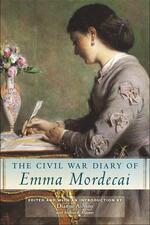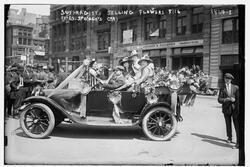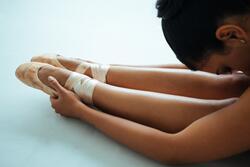Writing Jewish Women Into America's Story
American Jewish families often share stories about how our mothers, grandmothers, and great-grandmothers were actively involved in key US sociopolitical developments. However, until recently, history books, documentary films, and pop culture have been mostly silent about Jewish women’s contributions. Dr. Melissa R. Klapper, Professor of History and Director of Women's & Gender Studies at Rowan University, has devoted much of her career to correcting this omission. Her books on American Jewish women's history paint vivid human profiles and perspectives on what it was like to be a Jewish woman or girl at various times.
Sally Wiener Grotta sat down to chat with Melissa R. Klapper about her groundbreaking work on American Jewish women’s history. The following is an excerpt of that chat, edited for length and clarity. The full interview can be viewed here.
Sally Wiener Grotta: Melissa, you’ve devoted your career to telling stories about American Jewish women within the context of American history. What was the impetus behind that choice?
Melissa R. Klapper: Well, it goes back to when I was in graduate school getting my doctorate in American women's history. It ticked me off that there were basically no Jewish women showing up in the master narratives of American women’s history.
This is not an across-the-board truth, but it was often the case. We had research on American Jewish women in the labor movement; you can't write about women in the labor movement in the United States without Jewish women. There's also a fair amount of work on American Jewish women and Zionism, particularly through the history of Hadassah. Otherwise, you didn't see Jewish women showing up anywhere else. So, one of my prime motivations for my entire career has been to look at how American Jewish women were part of the master narratives of American women's history.
SWG: Your book Ballots, Babies, and Banners of Peace, tells the stories of American Jewish female activists in the late nineteenth and early twentieth centuries. When researching it, what correlations did you find between social activism and the nature of being a Jewish woman?
MRK: The Jewish women that I write about had different levels of attachment to—let's call it Jewishness. That could be religious, ethnic, cultural, heritage, or it could be just, “Oh, yes, I'm Jewish, and I'm not going to deny it.” But the bottom line is that, for most of them, Jewishness did have something to do with their activism. They wrote about their activism through a lens of “Because I am Jewish, I have an obligation to try to make the world a better place today.” We would use the term tikkun olam, repairing the world, though that's not a phrase that was in use in the period that I write about. But you do see references to tzedakah, which is often translated as charity. I would say it's better translated as a sense of righteous justice.
They also drew on biblical foremothers. For instance, some suffrage activists that I write about would give speeches in synagogues, and they would talk about Jewish women today needing to be more like the Deborahs and the Esthers of old. “They were judges, they were queens, they were public figures. We can be, too. We should be, too.” These were very effective arguments within and outside the Jewish community for why Jewish women should be playing an important role. “Look, we have this history and this set of ethics that we can bring to this movement.”
The movements that I write about—suffrage, birth control and peace—are different from each other. Jewish women were very heavily involved in suffrage on the ground, but they very rarely rose to the highest levels of leadership. There was quite a lot of antisemitism, racism, and xenophobia in the suffrage movement.
On the other hand, the way that Jewish women brought their Jewishness to their activism for birth control and peace had more of an impact, in part because they were more likely to achieve leadership positions in those two movements.
The tension around antisemitism and what we now would call progressive politics is not new. That's something I always deal with in my work. And it's distressing for me that it has this long history that pops up, but never seems to totally go away.
SWG: You paint such personal, and sometimes intimate, profiles of these women, as well as provide deep, rich textures about the world around them. What is your research process?
MRK: Something I absolutely love is the challenge of doing deep dives into archival research. I read huge amounts for all my books, especially diaries and personal letters that no one has looked at since they were written.
What you never find is a diary in which somebody wrote, “Today I'm going to write about X, because this is the way that I'm feeling about Y.” So you have to piece together narratives to make sense of people's lives.
I'm interested in recreating history from the bottom up, not just the top down. Some of the people I write about were leaders in the community. But I’m more interested in restoring individual voices, hearing what they said, getting better pictures of what their lives were like. You do that by piecing together a fragmented historical record and doing the best that you can to analyze what you have within larger frameworks.
SWG: After you’ve done all that intense research, you use it to write stories about very flesh-and-blood, fallible, interesting women.
MRK: Well, a word that you just used is a good word: fallible. I'm writing about real people. Real people are not perfect. They're not what you want them to be as sources.
A case in point is my book The Civil War Diary of Emma Mordecai (co-authored with Dianne Ashton) which is coming out this October. Emma is a good example of somebody who is extremely flawed by today's standards. She was a racist slave owner. There's just no getting around it. And her Civil War diary is a testament to how there were American Jews who were rabid Confederate nationalists and who sincerely believed in the racist system of slavery. She saw herself as a kind, benevolent owner of enslaved people, which she wasn't. She wasn't physically violent, but she did constantly threaten to sell the enslaved people she owned, which is another kind of violence.
So she's fallible, but still invaluable to the historical record. We have very few Civil War diaries from Jewish women, let alone from the South. She's not the only one, but there aren't many others, and hers is a very raw document.
SWG: I enjoy your stories about individual women. Do you have one or two women, not among the well-known higher ups, who exemplify Jewish women's involvement in key social movements?
MRK: Two sisters I love talking about—Maud Nathan and Annie Nathan Meyer—are not very well-known beyond people who care about Jewish women's history. Annie Nathan Meyer was one of the founders of Barnard College, and she was a playwright. She believed deeply in women's education. Maude Nathan was involved in the National Consumers League. So she advocated on behalf of working class women and men. Maude became probably the most prominent American Jewish woman in the suffrage movement.
So here you have these two sisters. They grew up in the same house, with the same parents and similar educations. But Maud Nathan was a fervent suffragist. And Annie Nathan Meyer was just as fervent an anti-suffragist.
The only real explanation possible for why Annie Nathan Meyer was anti-suffrage was that she and Maud could not stand each other. Maud would say, “Yay!” and Annie would say, “Nay!” One would write a letter to the editor of a newspaper or magazine, and then the next week, the other would write an opposing letter. They debated each other in public venues. I'd like to think they were enjoying themselves a little bit, but that's hard to prove. My take is that it was personal animosity, because about two minutes after women finally got the right to vote, Annie Nathan Meyer joined the League of Women Voters.
I’ve gotten to know the people that I'm afraid I sometimes refer to as “my women.” It's hard to not feel that way when I've been writing about them for a long time, and there are people that I have written about extensively in multiple settings. And that's been fun for me. For example, I have now written about Jennie Franklin Purvin (a civic leader in Chicago) in multiple books. She is a star of my book Jewish Girls Coming of Age in America, 1860-1920. She is also in Ballots, Babies and Banners of Peace, and she is also making an appearance in my current project.
SWG: Could you tell us a bit about your current project?
MRK: I noticed in writing my books about American Jewish adolescent girls and American Jewish women activists, that they went abroad more than I might have thought. During the decades after the Civil War and before World War II is a period that we call the democratization of travel. Travel abroad became accessible, not just to the elite, but also to regular folks. People who were still working in sweatshops probably could not afford to go abroad. But anyone who was one step up the economic ladder—and most Jews were by the 1920s—could save up and go abroad at least once. Whether it was to visit the Der Alte Heym (“the old home” where their families had lived) or to go to Paris and see the Eiffel Tower, a huge number of American Jewish women and men went abroad, way more than anybody has ever realized.
This book, which is currently called At Home in the World: American Jewish Women Abroad, 1865-1940, will cover several generations of American Jewish women. And it looks at their travel thematically: their sightseeing, their education, their activism, the Jewish journeys that they took, the way that they did Jewish things abroad even when they did not do them at home, which was quite a common experience. Some of my old favorite people are showing up again. But I've also got new favorite people. I've done research in more than eighteen archives across the United States. It is full of great stories and also sharp analysis of the way that Jewish and gender and American identity intersected for women as they traveled abroad.
SWG: Well, from what I've read of your work, sharp analysis is a definite aspect of it, but it’s your engaging storytelling that makes the analyses, our heritage, and our foremothers come alive. Thank you.
Note: Dr. Klapper’s publishers have provided JWA readers with 30% discount codes for three of her books. For Ballots, Babies, and Banners of Peace: American Jewish Women’s Activism, 1890-1940, use promo code KLAPPER30_FM at www.nyupress.org. For Ballet Class: An American History, use promo code AAFLYG6 at www.oup.come/academic. And to pre-order The Civil War Diary of Emma Mordecai, use NYUAU30 at www.nyupress.org.








